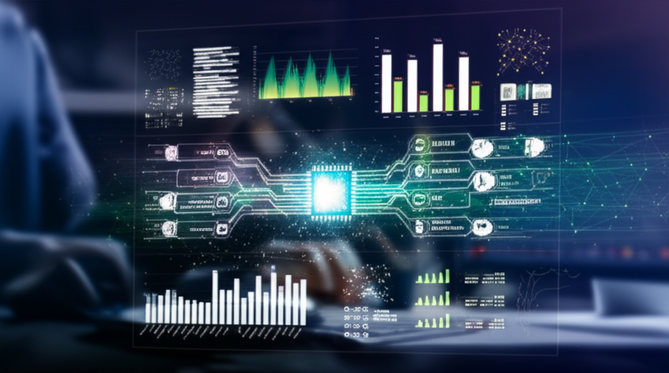Project management has evolved from traditional methods to an era profoundly influenced by Artificial Intelligence (AI). This transformation shifts from reactive management to proactive, intelligent automation, reshaping how projects are planned, executed, and monitored. AI’s capabilities in forecasting, risk assessment, and resource allocation streamline workflows and enhance accuracy.
AI is becoming the backbone of modern project management. It introduces automation that impacts efficiency, accuracy, and decision-making. By leveraging AI-powered tools, organizations can automate repetitive tasks, improve collaboration, and gain insights for informed choices. Future advancements in AI must be navigated alongside ethical considerations and challenges.
Why AI Now?
The integration of AI into project workflows is a present necessity, driven by several factors: increased data complexity, rising demand for efficiency, and accessible AI tools. AI’s ability to analyze vast datasets, identify patterns, and make predictions surpasses human capabilities, directly contributing to improved decision-making and optimized processes. This strategic shift is driving significant productivity gains.
Chapter 2: Mastering Task Allocation with AI
AI is revolutionizing task allocation in project management, moving beyond inefficient manual assignment to introduce precision and dynamism, fundamentally improving project delivery.
Beyond Manual Assignment: Optimizing Task Distribution with AI
AI-powered task allocation utilizes intelligent algorithms to analyze employee skills, workload, and project deadlines, optimizing distribution to maximize productivity and mitigate bottlenecks (Learn AIMastery – AI Productivity Tools Reshaping Our Workday). Its dynamic nature allows swift adaptation to changing priorities and ensures optimal resource allocation. AI also employs predictive modeling to forecast future resource needs, preventing bottlenecks and improving proactive planning.
Addressing potential biases in algorithms is crucial for fairness. This domain highlights human-AI collaboration, with AI handling computational aspects and human oversight ensuring strategic alignment and ethical considerations.
Benefits of Smart Allocation
The advantages of AI-driven task allocation are impactful:
- Improved Resource Utilization: AI streamlines assignment for optimal resource use, boosting efficiency (Learn AIMastery – AI Productivity Tools Reshaping Our Workday).
- Reduced Bottlenecks: Proactively identifies and mitigates bottlenecks by intelligently distributing tasks.
- Enhanced Team Productivity: Automates assignment and matches tasks to skills, increasing productivity and morale (Learn AIMastery – AI Automation in Digital Content Creation).
- Data-Driven Decision Making: Provides insights into task completion and resource efficiency for optimized workflows.
- Increased Accuracy and Reduced Errors: Minimizes human error, ensuring tasks are completed accurately and consistently.
- Scalability and Flexibility: Systems adapt easily to changing demands, scaling up or down for dynamic environments.
Chapter 3: Predictive Scheduling and Timelines
Accurate scheduling and adherence to timelines are paramount. AI transforms this domain with predictive capabilities and dynamic adjustments, moving to intelligent, adaptable schedules that enhance project success.
AI for Proactive Planning
Predictive scheduling leverages AI algorithms to analyze historical data, project complexities, and real-time resource availability, forecasting timelines with unparalleled accuracy. AI systems continuously monitor progress, identifying delays or bottlenecks, and proactively suggesting adjustments. For instance, AI uses predictive analytics to pinpoint common delay patterns and anticipate roadblocks (Learn AIMastery – AI-Powered Solutions for Manual Data Entry Challenges). Real-time data integration dynamically adjusts schedules (Learn AIMastery – AI Automation in Digital Content Creation). AI also optimizes resource allocation based on predicted needs, maximizing efficiency (Learn AIMastery – AI Productivity Tools Reshaping Our Workday). This extends to scenario planning, simulating various situations to identify risks and enable mitigation (Learn AIMastery – AI Is Revolutionizing Marketing Intelligent Email). Automated reports visualize progress and offer data-driven recommendations (Learn AIMastery – AI Monetization Through the Podcast Landscape).
Dynamic Rescheduling: Optimizing Project Flow with AI
Traditional scheduling struggles in dynamic environments. AI-powered dynamic rescheduling excels, employing advanced algorithms (e.g., machine learning) to continuously adapt and optimize schedules. These systems show tangible benefits in project efficiency across industries. Challenges include high-quality data input and human oversight to prevent biases. Future trends point towards greater integration with predictive analytics, Explainable AI (XAI) for transparency, and potentially blockchain for trust and security.
Chapter 4: Architecting Your AI-Enhanced Platform
Building an AI-enhanced project management platform requires careful consideration of core features, seamless integration, and robust implementation. This chapter explores foundational elements for designing a scalable and adaptable platform.
Key Features and Integrations
An effective AI-powered platform offers AI-powered task prioritization, automated scheduling, and insightful progress tracking (Learn AIMastery – AI Productivity Tools Reshaping Our Workday). AI-driven automation streamlines workflows through intelligent task assignment, tracking, and predictive analytics for resource allocation. Advanced analytics and reporting provide deeper insights into project performance, enabling predictive modeling for risk management and data-driven decision-making. Seamless API integrations are paramount for connecting with existing systems and business tools, ensuring smooth data flow (Learn AIMastery – AI-Powered Solutions for Manual Data Entry Challenges). Scalability means accommodating expanding needs and evolving AI technologies (Learn AIMastery – AI Automation in Digital Content Creation). Robust security and privacy protocols must safeguard sensitive project information (Learn AIMastery – An IoT Failure: Worst Nightmare).
Implementation Strategies: A Step-by-Step Guide
Successfully integrating an AI-enhanced project management platform requires a strategic approach:
- Choosing the Right AI Tools: Select tools integrating seamlessly with existing workflows, considering ease of use, compatibility, and specific automation goals (Learn AIMastery – AI Productivity Tools Reshaping Our Workday).
- Gradual Integration and Pilot Programs: Adopt a phased approach, testing AI tools on a small scale before wider implementation. Pilot programs identify challenges (Learn AIMastery – AI Automation in Digital Content Creation).
- Data Management and Privacy: Establish robust data management protocols addressing security, privacy, and compliance, as AI relies on vast datasets (Learn AIMastery – AI-Powered Solutions for Manual Data Entry Challenges).
- Training and Upskilling: Train employees to use new tools effectively through workshops and ongoing support (Learn AIMastery – Conversational AI in Language Learning).
- Overcoming Common Challenges: Proactively address hurdles like resistance to change, integration complexities, and ongoing maintenance (Learn AIMastery – AI Is Revolutionizing Marketing Intelligent Email).
- Monitoring and Evaluation: Establish KPIs to track AI’s impact for continuous improvement and value delivery.
Chapter 5: The Future of Work: AI-Driven Project Success
AI in project management culminates in continuous optimization and powerful human-AI collaboration. The future of work is not about AI replacing human roles but augmenting them, leading to unprecedented project success.
Continuous Optimization
AI’s role will deepen, offering nuanced forecasting via enhanced predictive capabilities considering complex variables and dynamic environments. This includes advanced probabilistic modeling and scenario planning. AI will refine its role in proactive risk management, identifying and mitigating risks with greater precision. Adaptive project scheduling will become the norm, with AI systems dynamically adjusting schedules in real-time, optimizing resource allocation and task sequencing.
This evolution solidifies human-AI partnerships. Effective collaboration and judicious human oversight remain crucial, leveraging AI’s strengths in computation and data analysis while maintaining human expertise, judgment, and strategic thinking.
Human-AI Collaboration: A Powerful Synergy
The synergy between human expertise and AI capabilities is the cornerstone of future project success. While AI tools boost productivity, efficiency, and decision-making, human creativity, critical thinking, and emotional intelligence remain indispensable. Successful partnerships show how AI handles data-intensive tasks and provides insights, freeing human project managers for strategic planning, complex problem-solving, and fostering team dynamics. Building effective human-AI teams involves understanding AI’s landscape, integrating tools seamlessly, and recognizing human input’s irreplaceable value. The transformative potential of advanced AI promises projects managed with unparalleled precision, adaptability, and collective intelligence.
Sources
- Learn AIMastery – AI Automation in Digital Content Creation
- Learn AIMastery – AI Is Revolutionizing Marketing: Intelligent Email
- Learn AIMastery – AI Monetization Through the Podcast Landscape
- Learn AIMastery – AI-Powered Solutions for Manual Data Entry Challenges
- Learn AIMastery – AI Productivity Tools Reshaping Our Workday
- Learn AIMastery – An IoT Failure: Worst Nightmare
- Learn AIMastery – Conversational AI in Language Learning



